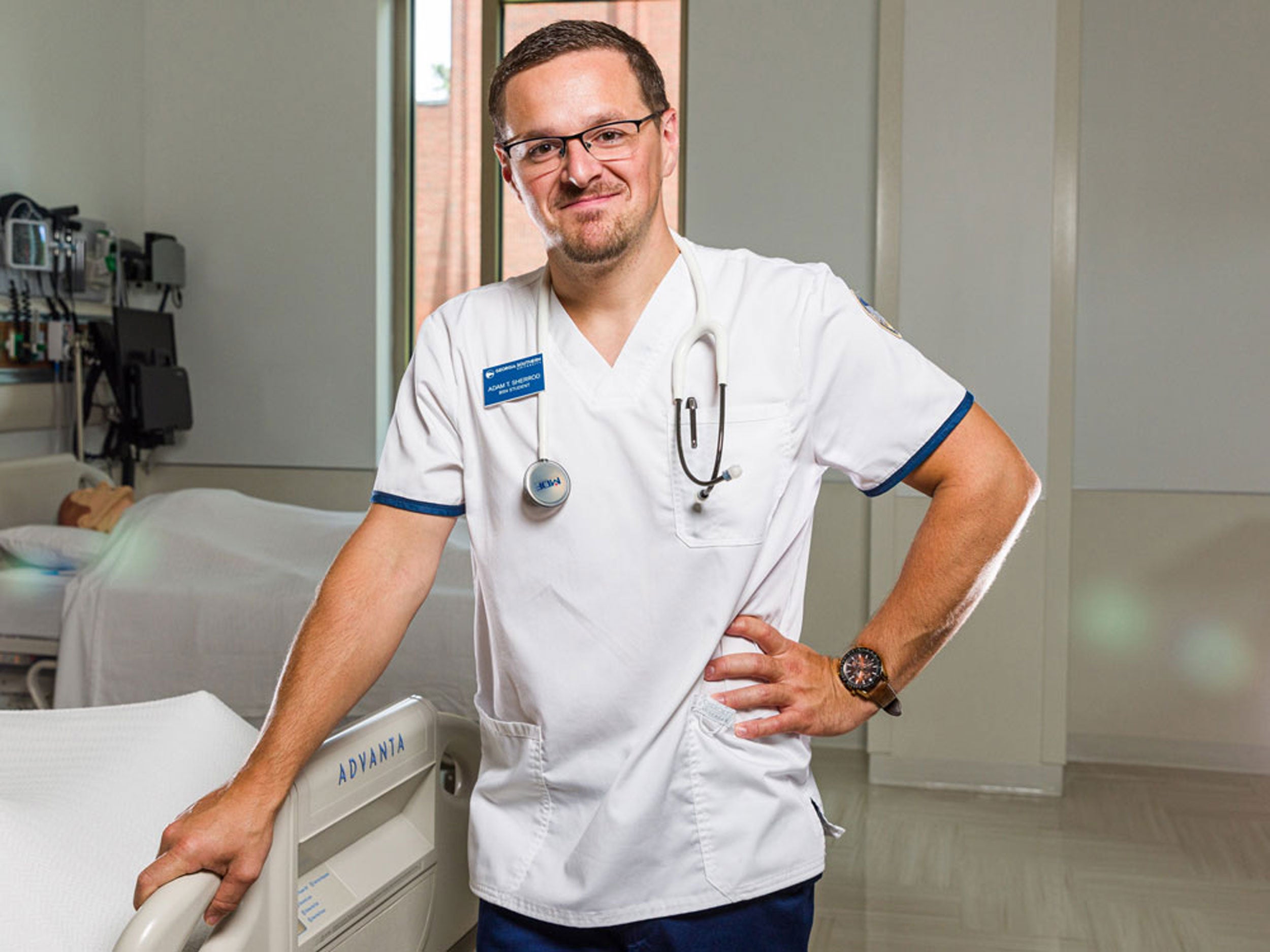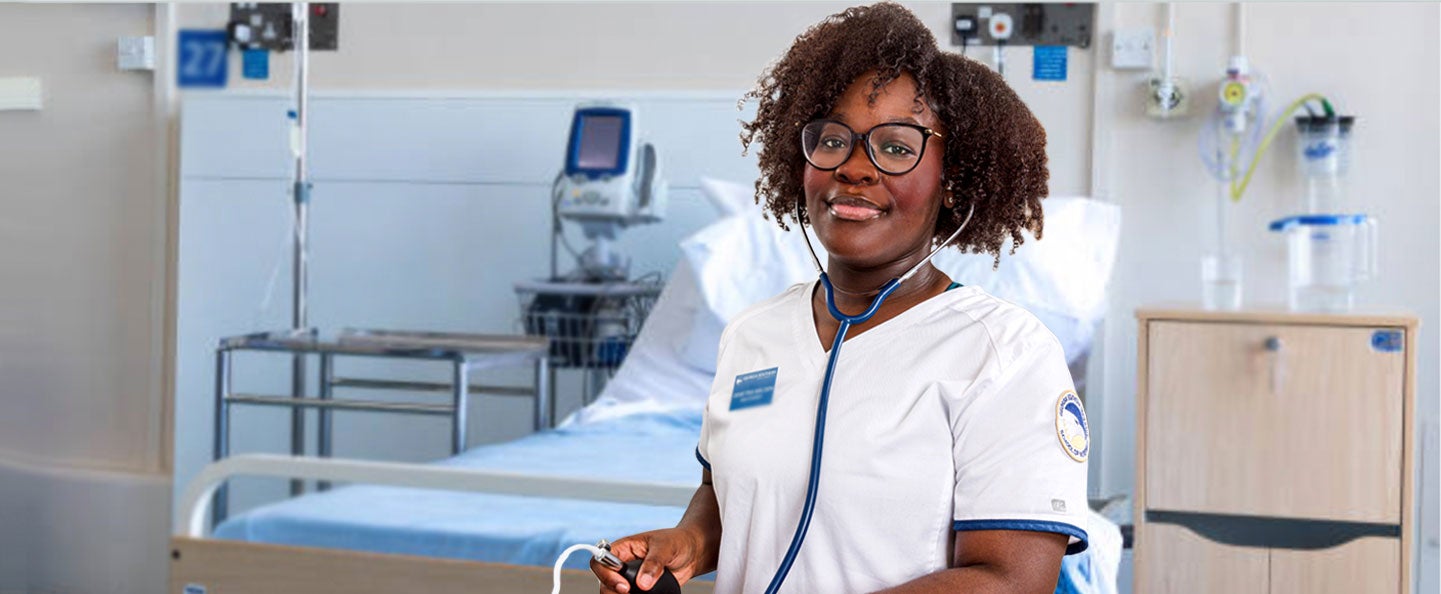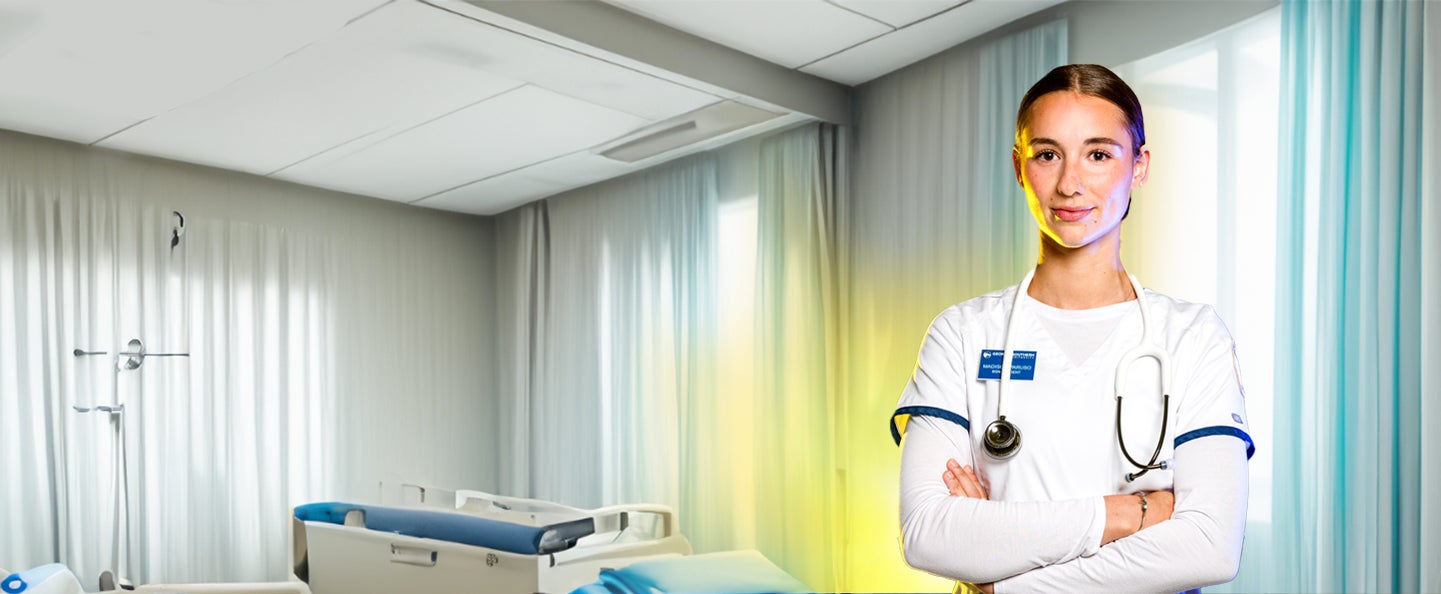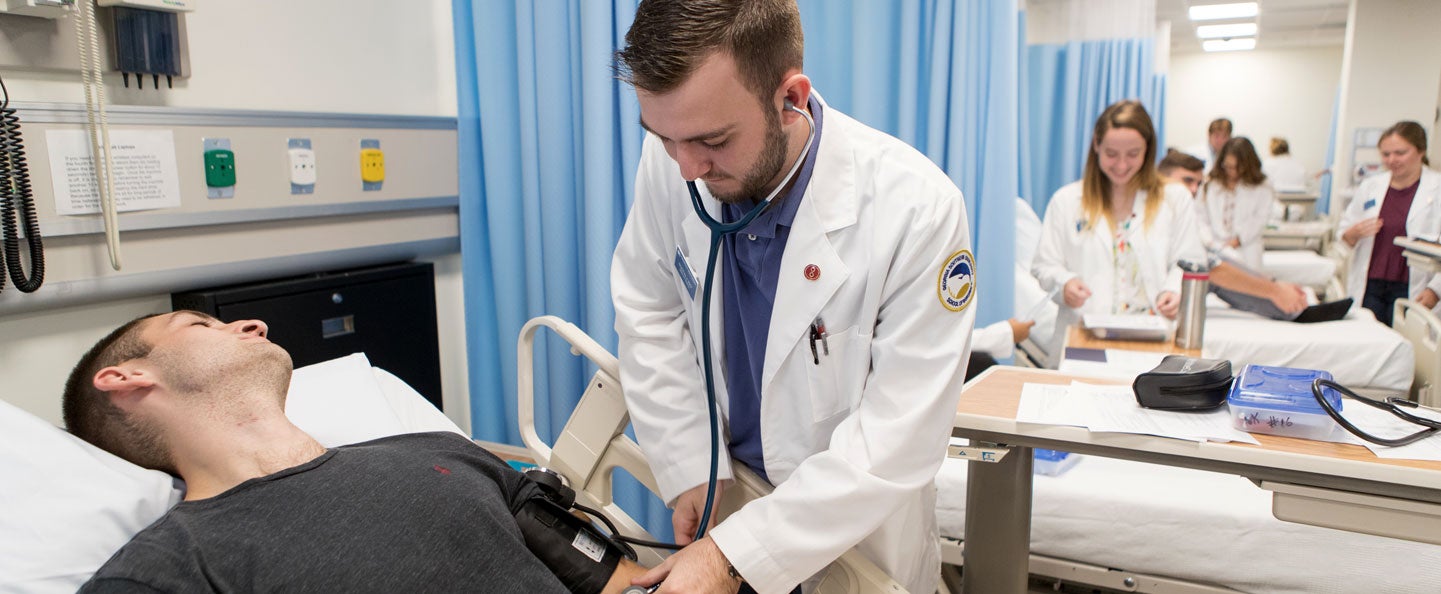Take your vocational knowledge and experience from the nursing field and turn it into credit towards an advanced placement in our BSN program.
Locations
- Statesboro Campus (In Person)
- Armstrong Campus (In Person)
Why Major in Nursing at Georgia Southern?
- 88.8% first-time pass rate on the NCLEX-RN.
- Accredited by the Georgia Board of Nursing and CCNE.
- 120 credit hours to completion.
- Complete fewer hours during designated semesters by testing out of up to 12 hours of course credit.
Georgia Southern’s School of Nursing offers an innovative advanced placement track, where the licensed practical nurse (LPN) can earn their BSN in a shorter amount of time. Upon acceptance, students have the opportunity to test out of up to 12 hours of nursing course credit.
The program places a strong emphasis on evidence-based and hands-on clinical work that prepares you for direct patient care in public health settings. Your comprehensive education at Georgia Southern sets you up to be highly competitive in the nursing field.
You will work on your degree in a variety of settings—hospitals, clinics, community health centers and our advanced simulation labs. Our expert faculty provide crucial support and mentorship as students conduct research on how to solve different medical challenges, and our alumni network provides strong career support.
The advanced placement track is also an affordable and flexible option. Along with a shortened time to graduation, many scholarships and financial aid packages are available, and multiple campuses, you can pursue your degree in a convenient manner.
Ready to Apply?
Or, you can:
What Can You Do With a BSN?
Nurses are in high demand, and with a BSN you will have numerous career options. You may find yourself working in hospitals and clinics, public health, home health, hospice, informatics or research. Many graduates go on to become travel nurses or pursue military nursing. A BSN can also be a springboard toward more specialized roles in leadership and management or in specific areas of health care, such as critical care, pediatrics or oncology.
Where our graduates work:
- Augusta University Health
- Aya Healthcare
- Baylor Scott & White Health
- Children’s Healthcare of Atlanta
- East Georgia Regional Medical Center
- Emory Healthcare
- HCA Healthcare
- Memorial Health
- Navicent Health
- Northside Hospital
- Piedmont Healthcare
- St. Joseph’s/Candler
- Wellstar Health System
- US Army
- US Department of Veteran Affairs
What our graduates do:
- Registered Nurse
- Nurse Practitioner
- Family Nurse Practitioner
- Nurse Case Manager
- Certified Registered Nurse Anesthetist
- Intensive Care Unit Nurse
- Director of Nursing
- Clinical Nurse Specialist
- Critical Care Registered Nurse
- Neonatal Intensive Care Nurse
- Emergency Room Nurse
- Acute Care Nurse Practitioner
What You’ll Learn
Classes for the BSN cover many areas within health care. Students will focus on central subjects such as anatomy and physiology, microbiology and standard practices in the nursing field.
Every student also completes courses on adult health, pharmacology, mental health, women’s and children’s nursing and community health.
See the CurriculumGlobal Nursing Education
Students can enroll in courses that are part of their nursing program while studying abroad.

Get Involved
Students have opportunities for leadership, research and skill development through the Student Nursing Association or the Sigma Theta Tau International Honor Society of Nursing.
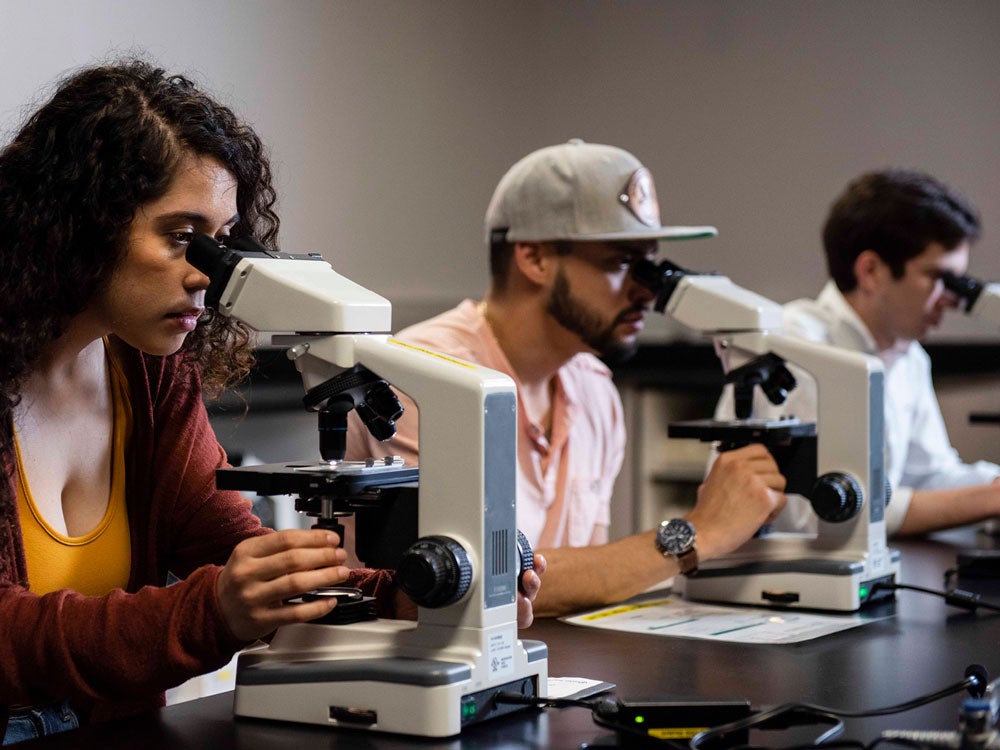
Get Covered
Whether you need student insurance or liability coverage for internships and practica, Georgia Southern has you covered.
Take Action
How to Apply
To be considered for the LPN/LVN Advanced Placement Track within the BSN program for the Fall/Spring admission cycle, the LPN must meet the regular admission requirements before the application deadlines. The LPN must also fulfill all current BSN admission criteria and follow the same application process.
All applicants must apply for admission to both the University and the School of Nursing.
Admission to the University does not guarantee admission to the School of Nursing.
Requirements for admission to the University and additional information may be found in the University General Catalog.
Applications for admission to the University are obtained from the Office of Admissions.
Application Deadlines:
Fall Admission: January 1 – February 8
Spring Admission: August 1 – September 15
Follow these steps to complete the Georgia Southern application:
Complete a Georgia Southern University application and be accepted into the university. Students must be accepted into the university prior to being accepted into the program.
Upon Admission to Georgia Southern University
After admission to Georgia Southern University, the student will make an appointment with their academic advisor. Advisement is critical for the LPN to best be prepared to apply for admission to the Baccalaureate Nursing Program (BSN) when core curriculum requirements have been met.
Admission Criteria
Admission to the Bachelor of Science in Nursing degree program is competitive and is based on requirements in place at the time of application to the BSN program. In order to be considered for the BSN program for the fall/spring admission cycle, applicants must meet the following admission criteria:
- Admission to Georgia Southern University. All transfer credits must be evaluated by the Registrar’s office and posted on the Georgia Southern transcript upon official acceptance to the University.
- An active GA LPN license and at least 12 months experience prior to application. Must maintain licensure while challenging nursing courses.
- Must be able to meet the Core Performance Standards.
- Have a minimum overall GPA of 3.0 at the time of application and upon admission into the nursing program.
- Achieve a cumulative score of at least 75% on the Evolve Reach Admission Assessment Exam from the following subject areas: Anatomy & Physiology, Grammar, Reading Comprehension, Vocabulary and General Knowledge, and Math. Admission Assessment scores must be no older than one year at the time of applications.
- Effective August 1, 2025 – All applicants must achieve a minimum score of 75% in each of the following subject areas on the Evolve Reach Admission Assessment Exam (HESI A2): Anatomy & Physiology, Grammar, Reading Comprehension, Vocabulary and General Knowledge, and Math. Admission Assessment Exam scores must be no older than 1 year at the time of application.
- Complete 12 of the 20 hours of required lab science course work (Core IMPACTS Lab Science Sequence, Microbiology, and Human Anatomy and Physiology I and II with Labs) with a minimum grade of “C” in both lab and didactic portions of each course at the time of application to the nursing program.
- Successful completion of 54 semester hours in appropriate core courses prior to admission.
- Sciences in Field of Study must have been completed within the past 5 years with a grade of “C” or higher.
- A grade of “C” or higher is required for the following Core IMPACTS: Communications in Writing, Mathematics and Quantitative Skills, Technology, Mathematics and Sciences, and Field of Study Courses.
- Post Baccalaureate students must have a minimum grade point average of 3.0 on grades earned in Statistics, Anatomy and Physiology I & II with labs, Microbiology, Pathophysiology and Lifespan Development to be eligible to apply to the program.
- Students admitted to the nursing major must maintain a minimum overall 3.0 GPA and a minimum grade of “C” in the following Core IMPACTS: Communications in Writing, Mathematics and Quantitative Skills, Technology, Mathematics and Sciences, and Field of Study Courses prior to beginning the first nursing course.
- Students with outstanding admission requirements must provide proof of meeting the requirements to the School of Nursing administrative assistant before the beginning of the admitted semester. Failure to do so will result in removal from the admitted list.
- Students who are dismissed from any nursing program due to course failures may be considered for admission to Georgia Southern’s nursing program after a period of five years.
- Repeating more than one course (didactic) or repeating once course (didactic) more than once in the following Core IMPACTS: Communications in Writing, Mathematics and Quantitative Skills, Technology, Mathematics and Sciences, and Field of Study Courses (thus 2 failures in one area) to earn a passing grade of “C” or better, makes the student ineligible for admission. For the post baccalaureate student, this applies to the Field of Study.
- Complete the School of Nursing BSN application.
Upon Admission to the Nursing Program
The LPN accepted to Georgia Southern University’s School of Nursing must meet with the BSN Program Director for a description of the APT program, consultation, and curriculum planning.
The APT LPN will have the opportunity to challenge by examination a total of 12 hours of nursing course credit.
- The APT LPN student will have the opportunity to challenge up to two nursing courses:
- NURS 3101: Skills and Essentials of Nursing Practice (Must pass skills proficiency and HESI Specialty Exam score minimum requirements).
- NURS 3107: Adult Health Nursing (HESI Specialty Exam score minimum requirements).
Students are permitted to take the HESI Specialty Exam for each course only once.
Upon admission to the program, students must:
- Attend the Incoming J1 Orientation
- Meet all School of Nursing continuance materials as outlined in the BSN Handbook.
Failure to comply with these guidelines may result in deferral of acceptance to a later semester.
To see how the program of study progresses course to course each semester, you can view a Program Map for the advanced placement track.
The School of Nursing offers more than 20 scholarships for undergraduate students. Apply today!
The Georgia Southern University School of Nursing is fully accredited by all appropriate national, state, and specialized/professional nursing accrediting agencies: The Commission on Colleges of the Southern Association of Colleges and Schools, the Georgia of Nursing, and the Commission on Collegiate Nursing Education.
Upon completion of the baccalaureate degree, the graduate will be able to:
- Demonstrate core knowledge from the liberal arts, sciences, and nursing as the foundation for entry level professional practice.
- Use knowledge of organizational systems, leadership principles, and resources to become responsible, safe, and accountable entry level professional nurses that demonstrate professional standards of moral, ethical, and legal conduct.
- Develop entry level clinical judgment/decision making by using health care information, technology, scholarship, inquiry, and current evidence to improve individual and population health care outcomes.
- Demonstrate entry level inter-professional communication to develop collaborative partnerships for improving patient health outcomes.
For further information, please consult the Student Handbook.
Tuition and fees charged by Georgia Southern University are approved by the University System of Georgia annually. See a comprehensive costs and affordability analysis.
The School of Nursing anticipates that graduates of this program will seek the following professional state licenses: professional registered nurse (RN).
For required disclosures on whether this program satisfies the license requirements of all states and territories for Registered Nurse license, check the requirements of your state or territory here.
The School of Nursing has determined that the required classes and educational activities of this academic program will qualify a graduate of this program to take the exam for a Registered Nurse license in the 50 U.S. states, the District of Columbia, and five U.S. territories: American Samoa, Guam, Northern Mariana Islands, Puerto Rico, and the Virgin Islands.
Georgia Southern makes every effort to ensure information about educational requirements for licensure or certification is current; however, state requirements may change. Separate from educational requirements, state licensure boards may require applicants to complete jurisprudence examinations, background checks, proof of clinical hours, or additional training. For more information, as well as for a list of applicable state boards, visit the Georgia Southern State Authorization and Professional Licensure Webpage.
Related Programs
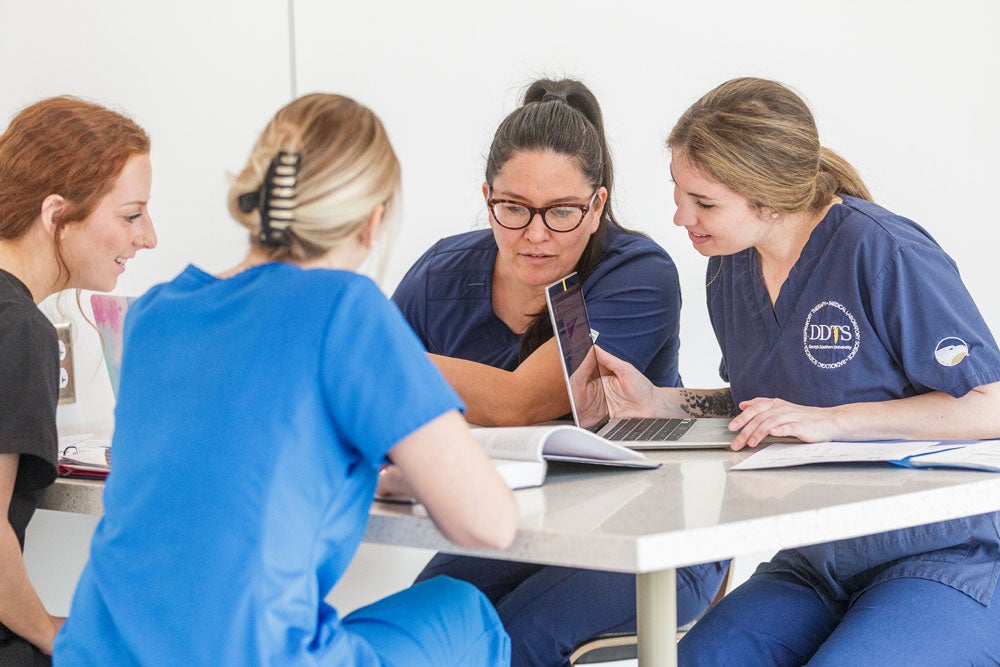
Take the Next Step
Build your nursing career today. Learn more about earning your Bachelor of Science in Nursing at Georgia Southern.
Contact Us
School of Nursing
Statesboro Campus
Nikiya Lewis, DNP, APRN, FNP-C
BSN Program Director
Phone: 912-478-5242
Email: nlewis@georgiasouthern.edu
Armstrong CampusKathryn Zeigler, MSN, APRN, FNP-BC
BSN Program Director
Phone: 912-344-3365
Email: kzeigler@georgiasouthern.edu

